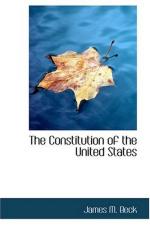As I was revising the proofs of these lectures in beautiful Chamonix, the prospectus of the Scottish-American Association reached me, in which its Honorary Secretary and my good friend, Dr. Charles Sarolea, took occasion to make the following suggestion to his British compatriots:
“To remove those causes of estrangement, to avoid a fateful catastrophe, in other words, to bring about a cordial understanding with America, the first condition must be an understanding of America. Such an understanding, or even the atmosphere in which such an understanding may grow, has still to be created. It is indeed passing strange that in these days of cheap books and free education, America should be almost a ‘terra incognita,’ that we should know next to nothing of American history, of the American Constitution, of American practical politics, of the American mentality. We scarcely read American newspapers or American books. Even such masters of classical prose as Francis Parkman, perhaps the greatest historian who has used the English language as his vehicle, are almost unknown to the average reader. Our students do not visit American universities as they used before the War to visit German universities. The consequence is that again and again we are running the risk of perpetrating the most grotesque errors of judgment, of committing the most serious political blunders, in defiance of American public opinion.”
The success of my Gray’s Inn lectures convinces me that Dr. Sarolea underestimates the interest in America and its history in England. However, the episode, which is treated in these lectures, is, as he says, “terra incognita” not only in England, but even in the United States. It is amazing how little is known in America of the facts given in my second lecture. The American student, after rejoicing in the victory at Yorktown and the end of the War of Independence, generally skips about eight years to 1789, mid his interest in the history of his own country recommences with the inauguration of President Washington.
Students of history in both countries thus miss one of the most interesting and instructive chapters of American history, and indeed of any history.
I have ventured to add to my Gray’s Inn lectures another address, which I delivered as the “annual address” at the session of the American Bar Association in Cincinnati, Ohio, on August 31, 1921. I do so, because it has a direct bearing on the decay of the spirit of constitutionalism both in America and elsewhere. It discusses a great malaise of our age, for which, I fear, no written Constitution, however wise, is an adequate remedy. It was published in condensed form in the issue of the Fortnightly for October, 1921, and an acknowledgment is due to its courteous editor for permission to republish it.
I have forborne in these lectures to make more than a passing reference to the League of Nations and the great Conference which framed it, tempting as the obvious analogy was. The reader who studies the appendices will see that the Covenant of the League more nearly resembles the Articles of Confederation than the Constitution of 1787.




